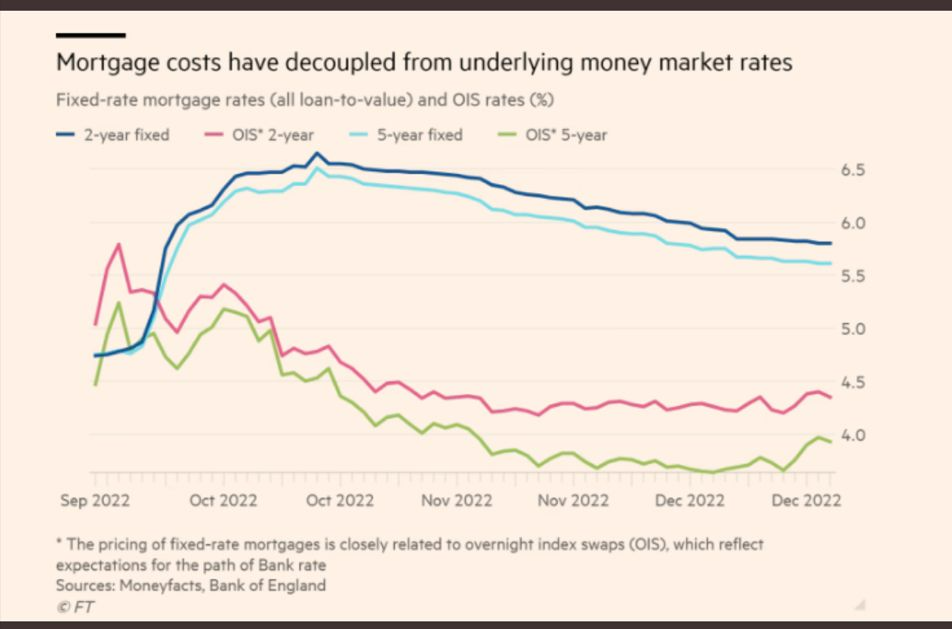The Recent Change That Has Created More Competition And Flexibility From Lenders
The Impact of Mortgage Rates Decoupling From Overnight Index Swap Rates: An Overview Of The Risks And Benefits

*Image created by Financial Times
Mortgage rates decoupled from overnight index swap (OIS) rates in mid-September this year, largely as a result of the chaos created by the Liz Truss and Kwasi Kwarteng mini budget debacle. The Financial Times have created a compelling graph ( above ) showing how this has played out for the latter part of 2022.
Is this good or bad?
This change has created some benefits, but doesn't come without risks for borrowers and lenders.
What are Overnight Index Swap (OIS) rates?
Overnight index swap (OIS) rates are a type of benchmark interest rate that are used to set the terms of financial instruments like mortgages and loans. These rates are based on the rate at which banks lend money to each other overnight in the interbank market. OIS rates are often used as a benchmark for financial instruments because they are considered to be a stable and reliable indicator of market conditions. They are also used to hedge against interest rate risk by allowing financial institutions to exchange fixed and floating rate payments on a specific amount of money. Essentially, OIS rates provide a way for lenders and borrowers to agree on the terms of a financial instrument, such as the interest rate on a mortgage or loan.
How does this change affect mortgages?
While these rates are often closely linked, decoupling the mortgage rate from the OIS rate allows for more flexibility in setting the terms of a mortgage and may lead to greater competition among lenders, but it can also create uncertainty and increase risks for lenders.
Benefits of decoupling
- Increased flexibility: One of the main benefits of mortgage rate decoupling is increased flexibility in setting the terms of a mortgage. With traditional mortgage products, the interest rate is often tied to the OIS rate, which means that the lender has less discretion in setting the terms of the loan. However, with a decoupled mortgage rate, lenders have more freedom to set their own rates and terms, which can potentially lead to more customized mortgage products and better terms for borrowers. This increased flexibility can be especially beneficial for borrowers who have specific financial needs or goals, as it allows for the creation of mortgage products that are tailored to their individual circumstances.
- Greater competition: Another potential benefit of mortgage rate decoupling is greater competition among lenders. When the mortgage rate is tied to the OIS rate, lenders may have less incentive to offer competitive rates and terms, as they are constrained by the benchmark rate. However, with a decoupled mortgage rate, lenders are free to set their own rates and terms in order to attract business from borrowers. This increased competition can potentially lead to lower mortgage rates and better terms for borrowers, as lenders are forced to be more competitive in order to attract business.
Risks of decoupling
- Increased uncertainty: While there are potential benefits to mortgage rate decoupling, it's important to also consider the risks involved. One potential risk is increased uncertainty for both borrowers and lenders. With a traditional mortgage, the interest rate is tied to the OIS rate, which makes it easier to predict future mortgage rates, as they are likely to move in line with the OIS rate. However, with a decoupled mortgage rate, it may become more difficult to predict future mortgage rates, as they may fluctuate independently of the OIS rate. This increased uncertainty can create challenges for both borrowers and lenders, as it may be harder to determine the future cost of borrowing.
- Higher risk for lenders: Another potential risk of mortgage rate decoupling is increased risk for lenders. When the mortgage rate is tied to the OIS rate, lenders have a degree of predictability in terms of the future cost of borrowing. However, with a decoupled mortgage rate, lenders may face increased risk if they are unable to accurately predict future mortgage rates. If lenders misjudge the market and set their mortgage rates too high or too low, they may face higher default rates and financial losses. This increased risk can be especially challenging for smaller lenders who may have less financial resources to absorb potential losses.
The complexities of borrowing and assessing lenders may now become even greater as lenders review their product offerings. As such, seeking expert, independent and experienced mortgage advice will be more important than ever.
Who Are Willow Private Finance?
Willow Private Finance is a specialist mortgage brokerage that offers professional financial advice and assistance to clients seeking to secure a mortgage or refinance their existing mortgage. The company is dedicated to providing its clients with personalized and tailor-made solutions to meet their specific financial needs and goals.
With a team of highly qualified and experienced mortgage advisors, Willow Private Finance is able to offer expert advice and guidance on a wide range of mortgage products and options, including first-time buyer mortgages, buy-to-let mortgages, Commercial mortgages, Bridging finance, Lombard lending, and Development finance. The company also offers a range of services to help clients navigate the complex and often confusing process of securing a mortgage, including assistance with mortgage application and documentation, as well as ongoing support throughout the mortgage process.
In addition to its mortgage brokerage services, Willow Private Finance also offers a range of other financial services, including protection insurance and equity release.. The company's goal is to provide its clients with a comprehensive and holistic approach to finance and management, helping them to achieve their financial goals and secure their financial future.










